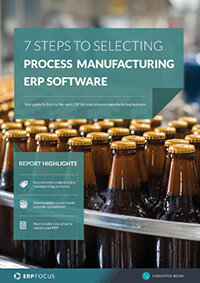ERP in Process Manufacturing: Production Scheduling
Production scheduling is one of the three or four business design decisions you will make that will have a critical and disproportionate affect on your long-term service level. Great care should be taken to consider the implications of production scheduling when considering an ERP implementation. Production scheduling in process manufacturing is typically a cross between a science and an art, since production scheduling problems generally have multiple solutions involving tradeoffs between capacity, cost, lead time, and quality. The choice between multiple solutions in process manufacturing occurs because often in-process intermediates can be borrowed, modified, or quickly replaced in the short term, or machine setups changed to accommodate a changing customer need.
Understanding the 90/10 Rule
It is important to try to understand the reality of your production scheduling process with as much impartial honesty as possible. The term “honesty” creeps in because there is often a gap between the way the operation would like to be scheduled (for example, “We only run this product on first shift after a complete machine clean”) and the way it actually is scheduled. You may find your production schedulers aren’t very eloquent at articulating why they do things the way they do; they just know what has kept them out of trouble in the past. Production schedulers in process manufacturing tend to earn their keep by being good at exception management. Ninety per cent of the production follows more or less automatic scheduling rules that everyone knows and understands, and ten per cent requires intelligent violation of those rules.
Not all Orders are Created Equal
Generic scheduling packages generally optimize around one trade-off dimension – for instance, cost – and create the most efficient schedule around that dimension. However, all that normally accomplishes is to schedule the ninety per cent that everyone knew how to schedule, anyway. There are times when quality problems or customer emergencies make service a higher priority than cost. In those cases, the production scheduling system needs to recognize that not all orders are created equal and allow for efficient flexibility. True value-add occurs if the package can also make explicit the implications of various decisions on the different trade off dimensions (like how much additional cost will be incurred, or how much capacity will be lost).
If you determine that the production scheduling software in your ERP system is not sophisticated enough for your needs, you can choose to write, or modify, your own. Be prepared for this decision to cascade into a host of new complications as you must thoroughly learn how the scheduling system interacts with internal work orders, inventory movements, capacity and demand planning, and available to promise logic.
The recurring message here is that the inherent flexibility in process manufacturing typically manifests itself in more flexible service offerings to customers. Your ERP production scheduling package needs to be evaluated in terms of that offering.
Featured white papers
-

7 Steps to Selecting Process Manufacturing ERP
Your guide to finding the right ERP software for your process manufacturing business
Download
Related articles
-

Three CRM features to look for in your next manufacturing ERP
ERP CRM modules can be very useful for manufacturers. Here's how to make the most of yours
-

How the right ERP can help you launch a successful omnichannel business
Petersen Zhu, CEO of DigitBridge and Vibes Base, shares how to create a scalable omnichannel stra...
-
![Three direct links between ERP and manufacturing revenue [image by Snowing on Freepik] Three direct links between ERP and manufacturing revenue [image by Snowing on Freepik]](/pictures/W1siZiIsIjIwMjUvMDEvMjAva2ZwYjAzb3gzX1RocmVlX2RpcmVjdF9saW5rc19iZXR3ZWVuX0VSUF9hbmRfbWFudWZhY3R1cmluZ19yZXZlbnVlX2ltYWdlX2J5X1Nub3dpbmdfb25fRnJlZXBpa18uanBnIl0sWyJwIiwidGh1bWIiLCI0MDB4MjY2IyJdLFsicCIsImVuY29kZSIsImpwZyIsIi1xdWFsaXR5IDg1Il1d/Three%20direct%20links%20between%20ERP%20and%20manufacturing%20revenue%20%5Bimage%20by%20Snowing%20on%20Freepik%5D.jpg?sha=b45b02a140cc8680)
Three direct links between ERP and manufacturing revenue
What you need to know to help you achieve a return on your manufacturing ERP investment

